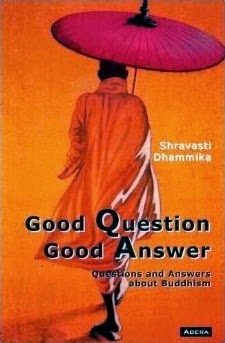What is Buddhism?
The name of Buddhism comes from the word ‘Budhi’ which means
‘ to wake up’ and the Buddhism is the philosophy of awakening. The philosophy
has its origin is the experience of the man Siddhata Gautama, known as the
Buddha, who was himself awakened at the age of 36. Buddhism is now 2,500 years
old and has about 300 million followers world-wide. Until a hundred years ago,
Buddhism was mainly an Asian philosophy but increasingly it is gaining
adherents in Europe and America.
So Buddhism is just a philosophy?
The word philosophy comes from two words ‘philo’, which
means ‘love’, and ‘Sophia’ which means ‘wisdom’. So philosophy is the love of
wisdom or love and wisdom both meaning describing Buddhism perfectly. Buddhism teaches that we should try to
develop our intellectual capacity to the fullest so that we can understand
clearly. It also teaches us to develop love and kindness so that we can be like
a true friend to all beings. So Buddhism is a philosophy but not just a
philosophy. It is the Supreme philosophy.
Who was the Buddha?
In the year 563 BC a boy was born into a royal family in
Northern India. He grew up in wealth and luxury but eventually found that
worldly comfort and security do not guarantee happiness. Ha was deeply moved by
the suffering he saw all around – and resolved to find the key to human
happiness. When he was 29 he left his wife and child and set off to sit at the
feet of the great religious teachers of the day to learn from them. They taught
him much but none really knew the cause of human sufferings and how it could be
overcome. Eventually, after six years study and meditation he had to experience
in which all ignorance fell away and he suddenly understood. From that day
onwards, he was called Buddha., the Awakened One. He lived for another 45 years
in which time he traveled all over Northern India teaching others what he had
discovered. His compassion and patience were legendary and he made thousands of
followers. In his eightieth year, old and sick, but still happy and at peace,
he finally died.
Was the Buddha a God?
No, he was not. He did not clime that he was a god, the
child of a god, even the messenger from a god. He was a man who perfected
himself and taught that if we followed his example, we could perfect ourselves
also.
If the Buddha is not a god, than why do people worship him?
There are different type of worship. When someone worship a
god, the praise and honor him or her, make offering and ask for favors,
believing that god will hear their praise, receive their offerings and answer
their prayers. Buddhists do not indulge in this kind of worship.
The other kind of worship is when we show respect to someone
or something we admire. When a teacher walks into the room we stands up, when
me meet a dignitary we shake hands, when the national anthem is played we
salute. These are all gusters of respect and worship and indicate our
admiration for person or things. This is the type of Worship Buddhist practice.
A statue of Buddha with its hands rested gently in its lap and its
compassionate smile reminds us to strive to develop peace and love within
ourselves. The perfume in incense reminds us of the pervading influence of
virtue, the lamp reminds us of the light of knowledge and the flowers, which
soon fade and die, remind us of impermanence. When we bow, we express our
gratitude to the Buddha for what his teachings have given us. This is the
nature of Buddhist worship.
The Book was first written in 1987 in response to the
increasing interest in Buddhism amongst Singaporeans. To my surprise and
delight, it has turned out to be very successful. The BDMS alone ha sprinted
30,000 copies and it has been translated into several languages including
Tamil, Chinese and Nepali. Requests to for copies have come from as far away as
Australia, Argentina and the Seychelles Islands. In July this year, I visited a
remote hermitage high in the Himalayas in Ladakh only to discover that the
abbot had not only read Good Question Good Answer but greatly appreciated it.
All this had convinced me that this little book’s style and contents has filled
an important need and that revision and enlargement would enhance its value.
Hence this new edition. Those wishing to reprint Good Question Good Answer or
translate it may do without writing for permission. However, we should
appreciate it if you send us two copies and let us know how many copies have
been printed.
Ven S Dhammika
Singapore 1991.
This Book is strictly for free distribution, it is not for sale.
Contact:
The Corporate Body of Buddha Educational Foundation
11F., 55 Hang Chow South Road Sec.1, Taipei, Taiwan, R O C.
Tel: 866 - 2 - 23951198, Fax: 866 - 2- 23913415
Email: overseas@budaedu.org
Website:htpp://www.budaedu.org
Contact:
The Corporate Body of Buddha Educational Foundation
11F., 55 Hang Chow South Road Sec.1, Taipei, Taiwan, R O C.
Tel: 866 - 2 - 23951198, Fax: 866 - 2- 23913415
Email: overseas@budaedu.org
Website:htpp://www.budaedu.org


No comments:
Post a Comment